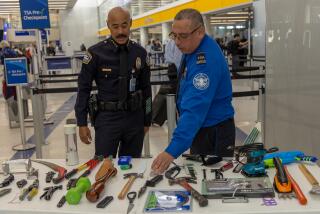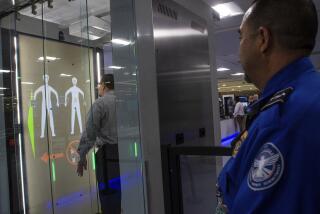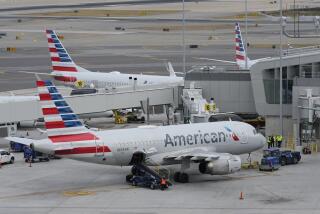Travel group pushes ‘trusted traveler’ screening program
The nation’s largest travel trade group launched an ad campaign last week to pressure Congress to adopt an alternative passenger screening program so that business travelers and other frequent fliers can zip through airports faster.
The U.S. Travel Assn. is promoting the idea of letting frequent travelers submit to background checks so they can speed through specially designated airport lines operated by the Transportation Security Administration. That is intended to shorten the lines for everyone else who has to go through the extensive pat-down searches and full-body scans.
Association President Roger Dow said the current screening system doesn’t work because it assumes all travelers pose the same threat. “A one-size-fits-all approach to security is inefficient,” he said.
The “trusted traveler” idea is not new and has critics. In the past, private security companies had mixed results performing background checks for frequent travelers. Some firms couldn’t register enough paying customers to survive, and several airports balked at providing terminal space for the new security lines.
To press Congress to back the idea, the travel association has already run ads in a national newspaper and has launched a website, betrustednow.org, that asks supporters to sign an online petition. Ads urging travelers to “tell Congress you want a trusted traveler program” will also appear at major airport terminals in June.
• Business travel spending is expected to keep growing
In another sign of a recovering economy, spending for business travel grew 3.2% in 2010 to about $230 billion, the highest level since before the recession, according to statistics released last week.
The numbers were issued by the Global Business Travel Assn., a trade group for business travel managers. The association predicts business travel spending will grow 6.9% this year to more than $245 billion.
The biggest growth last year came in international travel, which increased more than 17% to $29 billion from 2009. The business travel group predicts international travel will grow 8% in 2011.
That may help explain the addition of several overseas destinations from Los Angeles International Airport in the last few months.
American Airlines started nonstop flights from LAX to Shanghai this month. In March, Iberia kicked off nonstop flights from LAX to Madrid, and Turkish Airlines began flying nonstop from LAX to Istanbul.
• Americans pay higher airfares than Europeans
U.S. travelers, the founder of a popular travel website says, have become the airline industry’s sugar daddy.
Tom Parsons, who operates bestfares.com, made the remark after noticing that many major airlines are charging American travelers at least 30% more to fly to Europe than they are charging Europeans to fly along the same route to the U.S.
For example, he said a round-trip flight from LAX to Rome in mid-June on British Airways costs about $1,600, excluding taxes and surcharges. But if you are flying from Rome to LAX on the same airline in the same week, the airfare is less than $1,200.
“These are just day-and-night differences,” Parsons said.
The reasons, he explains, are that the U.S. economy is resurging and Americans are willing to pay higher fares. In contrast, he said, airlines can’t sell such expensive tickets to Europeans, who are struggling with high unemployment rates in some countries. “The Europeans aren’t putting up with it,” he said.
Airline officials confirm that the reasons for the price disparity are marketplace factors and the different peak travel seasons from country to country.
Said British Airways spokesman John Lampl: “Pricing is primarily based on supply and demand.”






